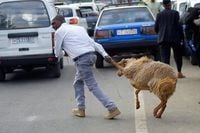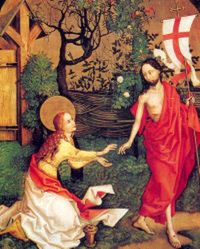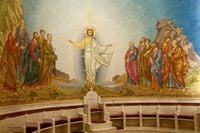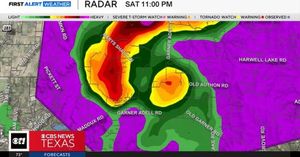Across the globe, Easter Sunday on April 20, 2025, is celebrated with a blend of religious devotion and cultural traditions, reflecting both joy and sorrow in various communities. From the Triangle area of North Carolina to the heart of Ethiopia, and even in the South Plains of Texas, the day resonates with themes of hope, resilience, and remembrance.
In Raleigh, North Carolina, the Ukrainian community gathered at Ridge Road Baptist Church to partake in traditional Pysanky (Ukrainian Easter egg) making, bake Eastern bread, and enjoy music, marking a bittersweet celebration amid ongoing conflict in their homeland. Olena Kozlova-Pates, a member of the community, expressed the complex emotions tied to this year’s festivities, stating, "Ukrainians are celebrating Easter this year with sorrow because Ukraine continues to be occupied, pillaged, and Ukrainians are killed and tortured." Despite these challenges, she emphasized a message of hope, saying, "We remember and believe that this holiday is the holiday that celebrates light over evil, and so we're hopeful that there will be victory for Ukraine."
Adding to the day's significance, Russian President Vladimir Putin announced an "Easter truce" on April 19, stating that military action would cease from 6 p.m. local time until midnight on April 21. This temporary pause in hostilities raises questions about the potential for peace in a region that has endured significant suffering.
Meanwhile, in Ethiopia, Easter, known as Fasika, was celebrated with calls for peace and unity in a nation grappling with armed conflict and political instability. Christians from various denominations came together to commemorate the resurrection of Jesus Christ, with Prime Minister Abiy Ahmed underscoring the need for dialogue and reconciliation. He remarked, "It takes patience, humility, and sacrifice to achieve dialogue and reconciliation to heal a nation."
At the Medhane Alem Cathedral in Addis Ababa, large congregations participated in services filled with acts of devotion, including kneeling and prostration. The presiding priest, Leul Adbaru, urged worshippers to reflect on the meaning of Jesus’s sacrifice, reminding them, "Ethiopians ought to believe, understanding for whom Jesus Christ died for on the cross at Calvary." Following the lengthy church services, attendees partook in feasts marking the end of a 55-day fasting period, with traditional meals that included raw meat—a staple during the celebrations.
As Fitsum Getachew, a casual laborer, noted, "At this feast prepared by our devout mothers we have partaken of all things, even chunks of raw meat and we are giving thanks unto God." For many, the spirit of charity remains central to the celebrations, as Mulumebet Jembere highlighted, stating, "Charity is the enduring spirit of Fasika and the poor will be looked after." This commitment to helping those in need resonates deeply as Ethiopians face the ongoing challenges in their country.
In the South Plains of Texas, families celebrated Easter with a mix of faith and tradition, balancing the joy of egg hunts with the deeper meaning of the holiday. Pastor Evan Havens of the Worship Center emphasized the importance of remembering the true significance of Easter amidst the festivities. He stated, "I don’t believe Easter egg hunts are evil at all. I believe it’s a way for kids to remember like, ‘Hey remember when we were at grandma’s house and we had an Easter egg hunt.'" He encouraged families to reflect on their beliefs, suggesting that the celebration should align with personal convictions. "Some people want to have an egg hunt. Some people think that egg hunts are sacrilegious; you can’t do that. I think you have to do it for yourself. You have to do what the Lord has put in your heart," he said.
Globally, Easter is a time that brings together Christians to commemorate the resurrection of Jesus Christ, marking a pivotal moment in the Christian calendar. It symbolizes hope, renewal, and victory over sin and death, as believers reflect on the significance of this event. The date of Easter varies each year, determined by the lunar calendar, and can fall between March 22 and April 25. This year, the convergence of celebrations across different cultures highlights the diverse ways in which faith is expressed.
Many Christians participate in sunrise services, church masses, and family gatherings, embracing both the spiritual and secular traditions associated with the holiday. The Easter Bunny, egg hunts, and chocolate eggs have become symbols of new life and spring, enhancing the festive atmosphere. Yet, for many, the core of Easter remains rooted in its religious significance, fostering a sense of community and shared beliefs.
As the world celebrates Easter, the juxtaposition of joy and sorrow is palpable. Communities like those in Raleigh, Addis Ababa, and the South Plains serve as reminders that amidst the festivities, there are deeper narratives of resilience, hope, and a longing for peace. The stories from these diverse celebrations illustrate how, even in challenging times, faith and tradition can bring people together, offering solace and strength.









